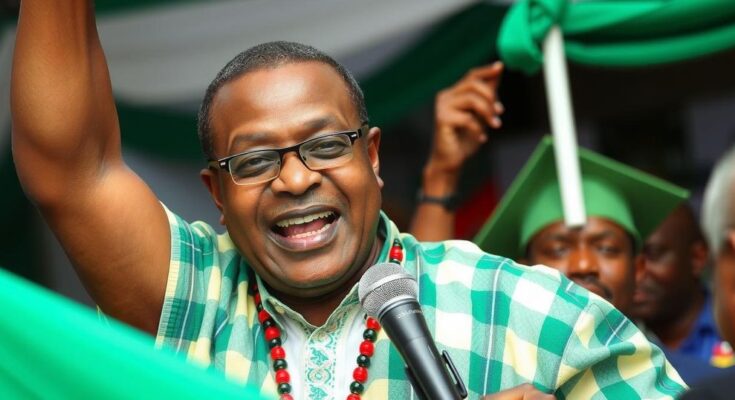Former President John Dramani Mahama won the presidential election in Ghana on December 7, as confirmed by outgoing Vice President Mahamudu Bawumia. Mahama’s return follows his previous term from 2012 to 2017, after losing two elections. The NDC is expected to lead in parliamentary elections as well. Economic dissatisfaction and corruption scandals have influenced voter sentiment, leading to Mahama’s victory despite challenges.
On December 7, former President John Dramani Mahama secured victory in the Ghanaian presidential election. Although the official election results are pending, outgoing Vice President Mahamudu Bawumia of the ruling New Patriotic Party (NPP) acknowledged Mahama’s win on December 8. With this victory, Mahama returns to the presidency after an eight-year interval; he previously held office from July 2012 until January 2017, when he lost to Nana Akufo-Addo, who was ineligible to run again due to term limits. Additionally, the National Democratic Congress (NDC), led by Mahama, appears to lead in the concurrent parliamentary elections.
The Independent Electoral Commission has urged the public to remain patient for the final results, which were anticipated after a calm electoral process, in accordance with expectations set by local bishops. This election outcome reflects a significant voter shift, likely influenced by Ghana’s recent economic turmoil marked by high inflation and increasing youth unemployment. Mahama’s campaign focused on revitalizing the economy, though he will face immediate concerns regarding a $3 billion loan sought from the International Monetary Fund to address urgent fiscal challenges. Furthermore, allegations of corruption among governmental officials have also disenchanted voters against the incumbents. Ghana, celebrated for its political stability and adherence to democratic norms, experienced relatively few incidents of violence during this election cycle, despite reports of isolated shootings resulting in fatalities in both the northern and central regions of the country.
Overall, Mahama’s return to power symbolizes a desire among citizens for change amid dissatisfaction with the previous administration’s handling of economic issues. The peaceful nature of the elections is a testament to Ghana’s commitment to democratic processes, even as it navigates challenges in governance and economic recovery.
The election in Ghana reflects a critical juncture for the nation, with John Dramani Mahama, a seasoned politician, reclaiming the presidency amidst a backdrop of economic difficulties and public dissatisfaction with the ruling party. His previous term (2012-2017) was followed by losses in two consecutive elections, indicating a volatile political landscape. The significant increase in inflation and unemployment has driven voters toward Mahama and the NDC as they seek solutions to pressing socio-economic challenges. The electoral process has generally been characterized by stability and respect for democratic principles, contrasting past instances of civil unrest linked to election outcomes, thus this election presents an opportunity for renewed leadership and reform in Ghana.
In summation, the election of John Dramani Mahama as the president of Ghana reflects the electorate’s demand for economic improvement and governance accountability. His victory, amid widespread challenges, underscores a collective hope for change and recovery. With attention now turning to the final election results and anticipated policymaking, Mahama’s administration will need to address both economic hardships and the trust deficits fostered by previous scandals, all within the framework of Ghana’s democratic tradition.
Original Source: www.fides.org




